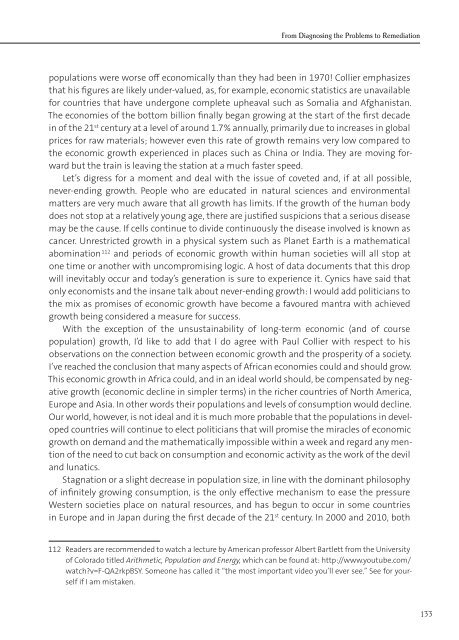Giant_and_Dwarf-FIN
Giant_and_Dwarf-FIN
Giant_and_Dwarf-FIN
Create successful ePaper yourself
Turn your PDF publications into a flip-book with our unique Google optimized e-Paper software.
From Diagnosing the Problems to Remediationpopulations were worse off economically than they had been in 1970! Collier emphasizesthat his figures are likely under-valued, as, for example, economic statistics are unavailablefor countries that have undergone complete upheaval such as Somalia <strong>and</strong> Afghanistan.The economies of the bottom billion finally began growing at the start of the first decadein of the 21 st century at a level of around 1.7 % annually, primarily due to increases in globalprices for raw materials; however even this rate of growth remains very low compared tothe economic growth experienced in places such as China or India. They are moving forwardbut the train is leaving the station at a much faster speed.Let’s digress for a moment <strong>and</strong> deal with the issue of coveted <strong>and</strong>, if at all possible,never-ending growth. People who are educated in natural sciences <strong>and</strong> environmentalmatters are very much aware that all growth has limits. If the growth of the human bodydoes not stop at a relatively young age, there are justified suspicions that a serious diseasemay be the cause. If cells continue to divide continuously the disease involved is known ascancer. Unrestricted growth in a physical system such as Planet Earth is a mathematicalabomination 112 <strong>and</strong> periods of economic growth within human societies will all stop atone time or another with uncompromising logic. A host of data documents that this dropwill inevitably occur <strong>and</strong> today’s generation is sure to experience it. Cynics have said thatonly economists <strong>and</strong> the insane talk about never-ending growth: I would add politicians tothe mix as promises of economic growth have become a favoured mantra with achievedgrowth being considered a measure for success.With the exception of the unsustainability of long-term economic (<strong>and</strong> of coursepopulation) growth, I’d like to add that I do agree with Paul Collier with respect to hisobservations on the connection between economic growth <strong>and</strong> the prosperity of a society.I’ve reached the conclusion that many aspects of African economies could <strong>and</strong> should grow.This economic growth in Africa could, <strong>and</strong> in an ideal world should, be compensated by negativegrowth (economic decline in simpler terms) in the richer countries of North America,Europe <strong>and</strong> Asia. In other words their populations <strong>and</strong> levels of consumption would decline.Our world, however, is not ideal <strong>and</strong> it is much more probable that the populations in developedcountries will continue to elect politicians that will promise the miracles of economicgrowth on dem<strong>and</strong> <strong>and</strong> the mathematically impossible within a week <strong>and</strong> regard any mentionof the need to cut back on consumption <strong>and</strong> economic activity as the work of the devil<strong>and</strong> lunatics.Stagnation or a slight decrease in population size, in line with the dominant philosophyof infinitely growing consumption, is the only effective mechanism to ease the pressureWestern societies place on natural resources, <strong>and</strong> has begun to occur in some countriesin Europe <strong>and</strong> in Japan during the first decade of the 21 st century. In 2000 <strong>and</strong> 2010, both112 Readers are recommended to watch a lecture by American professor Albert Bartlett from the Universityof Colorado titled Arithmetic, Population <strong>and</strong> Energy, which can be found at: http://www.youtube.com/watch?v=F-QA2rkpBSY. Someone has called it “the most important video you’ll ever see.” See for yourselfif I am mistaken.133


